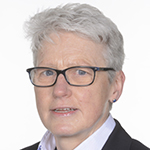
Please note: places for this lecture are full. If you wish to join the live stream, please register here.
World-renowned public health expert, and advocate for increasing the use of knowledge in healthcare policy and practice, Professor Trish Greenhalgh OBE will return to Australia this March to deliver a public lecture in Sydney, hosted by the Sax Institute and the three National Health and Medical Research Council partnership centres.
Speaking ahead of her visit, Professor Greenhalgh said her lecture – Measuring the impact of research: tensions, paradoxes and lessons from the UK – would deal with increasing pressure for academics to achieve ‘impact’, even though this term means different things to different people.
“Different ways of defining research impact drive different activities in higher education,” said Professor Greenhalgh. “If we define impact in terms of publishing in high-status academic journals, that’s all most academics will do. But we could define impact more broadly – in terms of research that changes policy (or, indeed, affirms existing policy by strengthening the underpinning evidence base), or research that contributes to a better society – for example by promoting public debate, enabling better use of societal resources or contributing to sustainability of the planet.”
A reference point on the fundamentals of evidence-based medicine
For international audiences, Professor Greenhalgh is perhaps best known as the author of the seminal How to Read a Paper: The Basics of Evidence-Based Medicine. This it has become a staple of university courses the world over and a reference point for anyone seeking to understand the basics of evidence-based medicine.
“I wrote the first edition when my younger son was a toddler and now he’s a junior doctor using the book to revise for postgraduate exams! Back in the mid-1990s when How to Read a Paper first came out, there was a prevailing assumption that knowledge ‘flowed’ from the research community into the world of practice and policy. All the evidence accumulated since suggests that it doesn’t. The most effective research – in my opinion – is research that is co-developed and also collaboratively delivered by researchers working WITH policymakers, clinicians, managers and patients or citizens,” said Professor Greenhalgh.
Lessons from the United Kingdom
Professor Greenhalgh’s lecture will also draw on her extensive experience at the forefront of increasing the use of knowledge in healthcare policy and practice in the United Kingdom. Policy frameworks such as the Research Excellence Framework (REF) and increased collaboration between researchers, policymakers and practitioners have seen co-developed and collaboratively conducted research becoming more commonplace in the UK.
First introduced in 2014, the REF is the UK’s system for assessing the quality of research in higher education institutions. “A huge strength is that (with the REF) there is both a ‘carrot’ and a ‘stick’ to incentivise impact-related activity by academics. In the UK, researchers are now following through on their research activity to try to drive their work into practice and policy. They are writing lay versions of their findings in plain English, spending time talking to policymakers, and adapting their recommendations so that they are workable in clinical practice,” she said.
Of course, the REF is not a panacea for all problems and like any framework, there are challenges to be addressed. “One weakness is that short-term, easily measurable impacts are much easier to document, so some of the long-game work may sometimes get overlooked. An obvious example is that it’s easier to change a paragraph in a guideline than ensure that the guideline is actually followed,” said Professor Greenhalgh.
Find out more
Professor Greenhalgh will be joined by Professor Anne Kelso, CEO of the National Health and Medical Research Council. Professor Kelso will discuss the perspectives and work of the NHMRC on measuring research impact. The lecture will be hosted by the Sax Institute and the three National Health and Medical Research Council partnership centres – The Australian Prevention Partnership Centre, the Cognitive Decline Partnership Centre and the Partnership Centre for Health System Sustainability.
